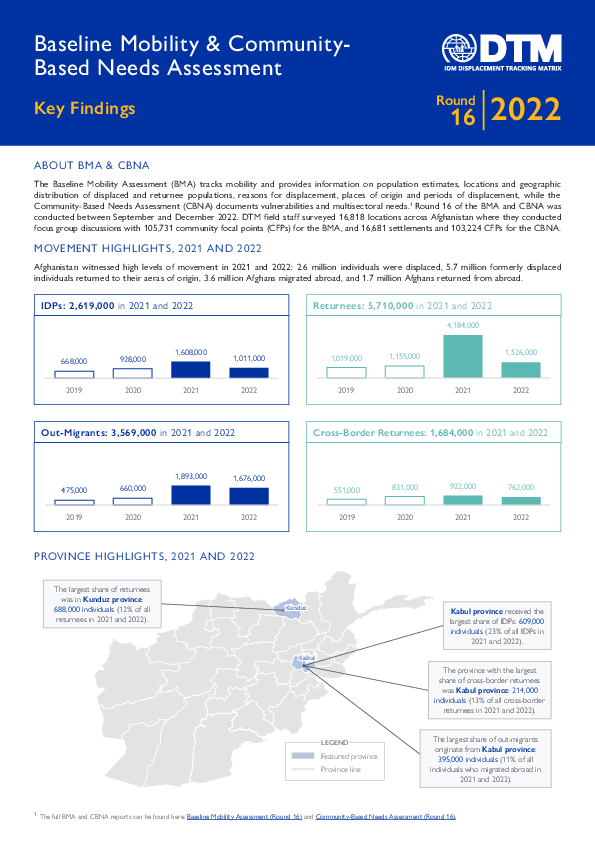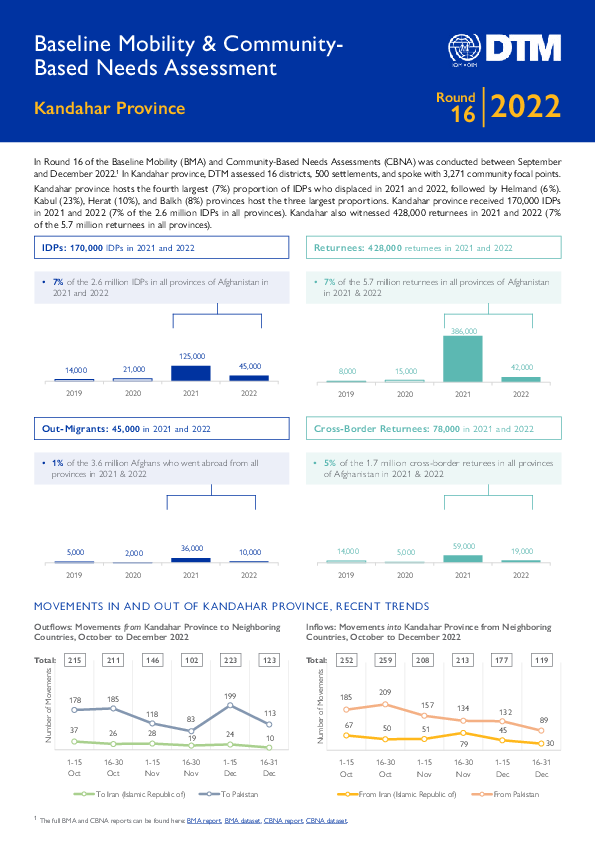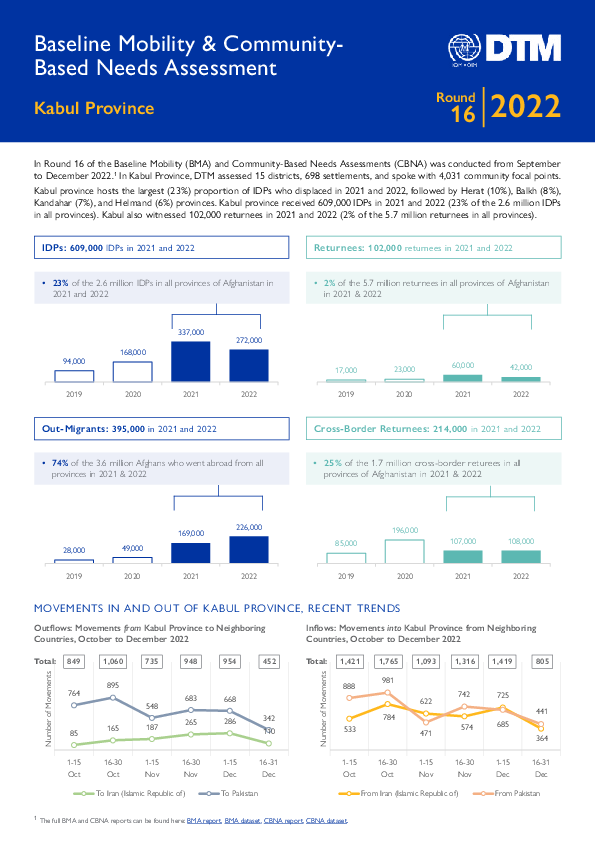-
Countries
-
Data and Analysis
-
Special Focus
-
Crisis Responses
Contact
DTM Sudan, DTMSudan@iom.int
Location
Sudan
Activity
- Mobility Tracking
- Baseline Assessment
Period Covered
May 19 2023 -Jun 28 2023
The current total estimate of recently displaced individuals across Sudan has reached 2,231,523 Individuals (447,031 Households). The current assessment has observed the IDP caseload in all of Sudan’s 18 states. The highest proportions of IDPs have been observed in River Nile (16.36%), Northern (15.81%), White Nile (11.36%), and West Darfur (11.12%) states.
Population Groups
Survey Methodology
Unit of Analysis Or Observation
Type of Survey or Assessment
Keywords
Geographical Scope
Administrative boundaries with available data
The current dataset covers the following administrative boundaries

Contact
DTM Uganda, dtmuganda@iom.int
Language
English
Location
Uganda
Period Covered
Jun 01 2023
Jun 30 2023
Activity
- Mobility Tracking
There was a notable reduction on the impacts, extent and intensity of disaster in the month of June. Floods were reported in Kasese, Bukedea and Kapelabyong. Heavy storms occurred in Namisindwa and Manafwa while landslides in Bududa. The disasters affected a total of 1,413 individuals, representing 393 households while 346 individuals from 100 households were internally displaced. Adults (19-64 years) were the most affected population group (47%), followed by children under 18 years (37%) and the elderly who are above 64 years (16%).
The most pressing needs are shelter, water supply and NFI.

Contact
DTM Peru, IOMDTMPeru@iom.int
Language
Spanish
Location
Peru
Period Covered
Jan 01 2023
Apr 30 2023
Activity
- Flow Monitoring
En Tacna, entre enero y abril de 2023, las protestas sociales continuaron parcialmente. Con base en la información de la Matriz de Seguimiento del Desplazamiento (DTM en adelante) de conteos de la Organización Internacional para las Migraciones (OIM), entre el 15 de febrero y el 2 de marzo se presentaron grandes flujos de entradas y salidas, de diversas nacionalidades incluyendo venezolanos, haitianos, ecuatorianos y colombianos, movilizándose principalmente del Perú hacía Chile, pero también en sentido norte, es decir con intenciones de entrada al Perú (DTM conteos Tacna - Ronda 48 a la 50). No obstante, el mayor impacto se produjo luego que el gobierno de Chile decretara, a fines de febrero, el despliegue militar en su frontera norte por 90 días, a través de Las Fuerzas Armadas de Orden y Seguridad. Así, desde la primera semana de marzo, se evidenció a su vez un aumento de los flujos de refugiados y migrantes entrando al Perú, sumado a las mayores dificultades para cruzar la frontera por pasos no habilitados. Esta situación, llevó a que en la región de Tacna se incrementaran las situaciones de pernocte en plazas y parques en dicha ciudad. A su vez, de manera paralela, la Policía peruana, ubicada en la Línea fronteriza entre Perú y Chile, llamada Línea de la Concordia, comenzó a requerir de documentación para el ingreso de refugiados y migrantes a Perú quienes venían cruzando por pasos no habilitados, como resultado, refugiados y migrantes de diversas nacionalidades, pero principalmente venezolanos y haitianos, varadas en la línea de frontera. En esa línea, el 27 de abril, el gobierno peruano decretó Estado de Emergencia por 60 días en una veintena.
Ante tal situación, la OIM reforzó la respuesta de asistencia a las personas varadas y en tránsito en Tacna, brindando orientaciones, distribuyendo kits de emergencia y alimentos, hidratación, monitoreando la frontera para identificar grupos familiares en situación de vulnerabilidad, coordinando con socios en el terreno, entre otros apoyos de primera necesidad.

Contact
DTM République Centrafricaine, DTMRCA@iom.int
Language
English
Location
Central African Republic
Period Covered
Jun 01 2023
Jun 30 2023
Activity
- Mobility Tracking
- Baseline Assessment
A partir de mai 2023, des conflits communautaires ayant éclaté au Tchad ont amené plus de 20 000 ressortissants tchadiens à trouver refuge en RCA. Les demandeurs d’asile tchadiens sont installés dans des localités frontalières en RCA se trouvant dans les communes de Mia-Pendé, Bah-Bessar (Ouham-Pendé) et Nana-Markounda (Ouham). L’arrivée de ces demandeurs d’asile exacerbe les besoins humanitaires dans cette zone qui accueillait déjà des populations déplacées internes et retournées.
En este reporte se presentan los datos obtenidos a través de la implementación de la Matriz de Seguimiento de Desplazamiento (DTM por sus siglas en inglés) bajo los componentes de seguimiento a la movilidad y de monitoreo de flujos en el periodo de enero a marzo de 2023 en localidades de Panamá, Costa Rica, Honduras y México.

Contact
DTMUkraine@iom.int
Language
English
Location
Ukraine
Period Covered
May 11 2023
Jun 14 2023
Activity
- Survey
Between 11 May and 14 June 2023, the International Organization for Migration (IOM) conducted the 13th round of a highly representative assessment of the general population in Ukraine to gather information on displacement, mobility flows, intentions, and conditions to inform targeted assistance to the war-affected population carried out in two stages. From Round 13 onwards, the survey methodology has been adapted to produce representative quarterly data at the oblast level. This round also introduces a new set of questions on durable solutions to internal displacement aligned with the criteria proposed by the Inter-Agency Standing Committee Framework on Durable Solutions for IDPs. The goal of the General Population Survey is to facilitate evidence-based decision-making on strategic, technical, and programmatic aspects of the response and recovery efforts in Ukraine, including the Government of Ukraine. The geographical scope of the assessment covers the entire territory of Ukraine, excluding the Autonomous Republic of Crimea and areas of Donetska, Luhanska, Khersonska and Zaporizka Oblasts under temporary military control of the RF. The General Population Survey was constructed through a random-digit-dial (RDD) approach, and 5,297 unique and anonymous respondents aged 18 and over were interviewed using the computer-assisted telephone interview (CATI) method. The estimates are based on UNFPA population data for Ukraine (last available data as of 14 November 2022), agreed as a common population baseline by the humanitarian community. Those currently outside Ukraine were not interviewed.

Contact
DTMAfghanistan@iom.int
Language
English
Location
Afghanistan
Period Covered
Sep 01 2022
Dec 31 2022
Activity
- Mobility Tracking
- Baseline Assessment
DTM has been conducting the Baseline Mobility Assessment (BMA) in Afghanistan since 2016 to track mobility, provide information on population estimates, locations and geographic distribution of displaced and returnee populations, reasons for displacement, places of origin and periods of displacement. The Community-Based Needs Assessment (CBNA) provides a comprehensive overview of the evolving vulnerabilities and multisectoral needs in communities hosting internally displaced persons (IDPs) and returnees from abroad.
Data is collected at the settlement level through focus group discussions with community focal points and direct observation. The figures presented in the report are estimates provided by community focal points.
The key findings report summarizes the results of Round 16 (Sep to Dec 2022) of the BMA and CBNA, focusing on the 2021-to-2022 period.
The full reports can be found here: Baseline Mobility Assessment and Community-Based Needs Assessment.

Contact
DTMAfghanistan@iom.int
Language
English
Location
Afghanistan
Period Covered
Sep 01 2022
Dec 31 2022
Activity
- Mobility Tracking
- Site Assessment
- Baseline Assessment
DTM has been conducting the Baseline Mobility Assessment (BMA) in Afghanistan since 2016 to track mobility, provide information on population estimates, locations and geographic distribution of displaced and returnee populations, reasons for displacement, places of origin and periods of displacement. The Community-Based Needs Assessment (CBNA) provides a comprehensive overview of the evolving vulnerabilities and multisectoral needs in communities hosting internally displaced persons (IDPs) and returnees from abroad.
Data is collected at the settlement level through focus group discussions with community focal points and direct observation. The figures presented in the report are estimates provided by community focal points.
This factsheet delves into the key findings in Kandahar province using the latest results from Round 16 (Sep to Dec 2022) of the BMA and CBNA, focusing on the 2021-to-2022 period.
The full report can be found here: Baseline Mobility Assessment and Community-Based Needs Assessment.

Contact
DTMAfghanistan@iom.int
Language
English
Location
Afghanistan
Period Covered
Sep 01 2022
Dec 31 2022
Activity
- Mobility Tracking
- Site Assessment
- Baseline Assessment
DTM has been conducting the Baseline Mobility Assessment (BMA) in Afghanistan since 2016 to track mobility, provide information on population estimates, locations and geographic distribution of displaced and returnee populations, reasons for displacement, places of origin and periods of displacement. The Community-Based Needs Assessment (CBNA) provides a comprehensive overview of the evolving vulnerabilities and multisectoral needs in communities hosting internally displaced persons (IDPs) and returnees from abroad.
Data is collected at the settlement level through focus group discussions with community focal points and direct observation. The figures presented in the report are estimates provided by community focal points.
This factsheet delves into the key findings in Kabul province using the latest results from Round 16 (Sep to Dec 2022) of the BMA and CBNA, focusing on the 2021-to-2022 period.
The full report can be found here: Baseline Mobility Assessment and Community-Based Needs Assessment.

